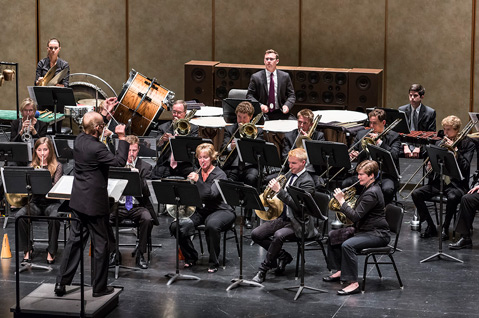Review: The Academy Festival Orchestra at the Lobero Theatre
The Music Academy Season Opens on Saturday, June 21

The 2014 Music Academy of the West season blasted off in truly spectacular fashion at this concert, which featured a fascinating arrangement of a work by Richard Strauss. Jay Friedman, the principal trombonist of the Chicago Symphony Orchestra and the author of the arrangement, was on hand to conduct this version of An Alpine Symphony, which involved a large ensemble of brass instruments, percussion, and an organ, rather than the full orchestra envisioned by Strauss. The piece dates from 1915 and finds Strauss in ravishing form, or should that be ravishing formlessness? Despite its title, there’s no discernible symphonic structure to these 21 musical episodes, which reveal every facet of the composer’s vast knowledge of orchestration for horns. The Alps may be the ostensible subject, but the music of Strauss’s contemporary Gustav Mahler looms as large as the Matterhorn in these jagged, majestic fragments of musical genius.
The program’s second half was conducted by Larry Rachleff and offered a classical alternative to the Romantic style so prominently featured in the first. For Sergei Prokofiev, the composer whose Symphony No. 1 in D Major, Op. 25 “Classical” followed the intermission, the classical style was a choice made in conscious reaction to what was perceived as the excesses of music, like Strauss’s Alpine Symphony, which was composed just two years prior. The Academy Festival Orchestra responded warmly to maestro Rachleff and quickly summoned the excitement that these opening concerts tend to induce. Prokofiev’s dancing, somewhat self-conscious take on the classical symphonic style flew by, leaving the happy audience in just the right state of anticipation for the night’s finale, the Symphony No. 2 in D Major, Op. 36 of Ludwig van Beethoven.
With youthful energy as your main resource, you can’t go too wrong programming Beethoven’s Symphony No. 2. While the work’s structure looks back to Mozart and Haydn, the music Beethoven makes from within those formal constraints nearly explodes with forward momentum. The young string sections rallied behind the fiery leadership of experienced concertmaster Jorja Fleezanis, who joins the Music Academy’s faculty this summer while continuing to hold an endowed chair as a professor in orchestral performance at Indiana University’s Jacobs School of Music. Fleezanis and Rachleff work well together, and the resulting performance brought an appreciative audience to its feet for a long ovation.
This triumph of musicianship was also clearly a triumph of intelligent, thoughtful programming, which bodes extremely well for what promises to be a very interesting summer. Pitting the extravagance of Strauss against both the neoclassical response of Prokofiev and the heady, nonstop invention of Beethoven in his classical mode sets up a fascinating dialogue that subsequent offerings from the Academy Festival Orchestra will surely continue to explore. In fact, the June 28 concert at the Granada Theatre, which will also be conducted by Rachleff, returns to the same three composers, although for different material. Strauss’s Vienna Philharmonic Fanfare is just two minutes long, but it will serve to remind listeners of the sprawling Alpine Symphony, and the fifth symphonies of Beethoven and Prokofiev that follow it will show these composers in the thick of dealing with their own impulses toward transcendence. It’s a delight to share this ongoing musical journey with the talented young musicians, who are clearly enjoying the process.



